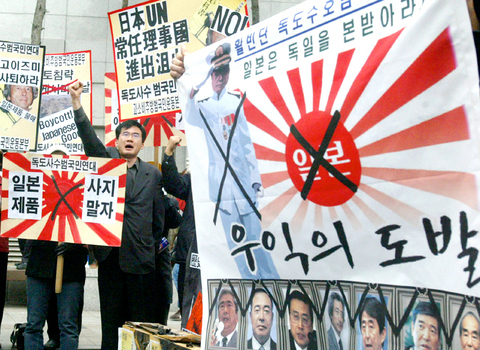A dispute over school textbooks escalated yesterday as Tokyo accused Beijing of whipping up anti-Japanese sentiment and the South Korean government summoned the Japanese ambassador over the issue.
Japan's decision on Tuesday to approve a textbook which both China and South Korea say glosses over Japanese wartime atrocities has opened old wounds.
The Japanese ambassador to Seoul was summoned yesterday to receive South Korea's protest over the textbook, one day after the ambassador in Beijing was called in to hear a similar protest from the Chinese government.

PHOTO: AFP
Koreshige Anami, Japan's envoy to Beijing, responded to the protest with robust criticism of the Chinese government.
"Anami expressed concern about recent anti-Japanese demonstrations in various cities in China," an embassy spokesman said. "He asked the Chinese authorities to take necessary measures to protect Japanese people and companies' activities in China.
"He observed that patriotic education in China may have caused some anti-Japanese feelings among young Chinese people. Anami asked the Chinese government to pay full attention to this aspect," the spokesman said.
China's state-controlled media reacted furiously, accusing Japan of not being able to face up to its past.
"One thing is for sure, and that is a country's prestige is not built on subterfuge, but its acknowledgment of the past," the China Daily said in an editorial, which called the textbook a "political provocation."
"Without a consensus on the history issue and other disputes, the Asian peoples cannot place their trust in Japan's desire to play a bigger role in world affairs," it said.
Local academics warned that the Sino-Japanese row may spill over into trade.
Some Chinese shops have stopped selling selected Japanese goods in protest, an industry official confirmed yesterday. It was not clear how many stores had stopped selling Japanese products, but one association official said the boycott campaign had begun in Shanghai and the northeastern city of Shenyang.
In recent days, crowds opposed to Japan's bid for a permanent seat on the UN Security Council have gathered outside Japanese-owned department stores and supermarkets in several Chinese cities.
In some instances, they have smashed windows or tried to hoist the Chinese flag.
Anami defended Japan's decision to approve the textbook, one of eight that can be used to instruct students aged 13 to 15 from April next year, saying it was a question of freedom of expression.
"Textbooks for Japanese schools are not made by the government or government organizations, but by private companies," the spokesman said, citing Anami. "In Japan we ensure freedom of speech and publication. So if draft textbooks submitted by publishing companies to the ministry of education fulfill certain criteria, they are allowed to be published."
The book avoids the word "invasion" when it refers to Japan's military occupation of other Asian countries in the first half of the 20th century.
It also refers to the 1937 Nanjing Massacre -- in which some historians say at least 300,000 Chinese civilians were slaughtered by Japanese troops -- as an "incident" in which "many" Chinese were killed.

MONEY GRAB: People were rushing to collect bills scattered on the ground after the plane transporting money crashed, which an official said hindered rescue efforts A cargo plane carrying money on Friday crashed near Bolivia’s capital, damaging about a dozen vehicles on highway, scattering bills on the ground and leaving at least 15 people dead and others injured, an official said. Bolivian Minister of Defense Marcelo Salinas said the Hercules C-130 plane was transporting newly printed Bolivian currency when it “landed and veered off the runway” at an airport in El Alto, a city adjacent to La Paz, before ending up in a nearby field. Firefighters managed to put out the flames that engulfed the aircraft. Fire chief Pavel Tovar said at least 15 people died, but

LIKE FATHER, LIKE DAUGHTER: By showing Ju-ae’s ability to handle a weapon, the photos ‘suggest she is indeed receiving training as a successor,’ an academic said North Korea on Saturday released a rare image of leader Kim Jong-un’s teenage daughter firing a rifle at a shooting range, adding to speculation that she is being groomed as his successor. Kim’s daughter, Ju-ae, has long been seen as the next in line to rule the secretive, nuclear-armed state, and took part in a string of recent high-profile outings, including last week’s military parade marking the closing stages of North Korea’s key party congress. Pyongyang’s official Korean Central News Agency (KCNA) released a photo of Ju-ae shooting a rifle at an outdoor shooting range, peering through a rifle scope

South Korea would soon no longer be one of the few countries where Google Maps does not work properly, after its security-conscious government reversed a two-decade stance to approve the export of high-precision map data to overseas servers. The approval was made “on the condition that strict security requirements are met,” the South Korean Ministry of Land, Infrastructure and Transport said. Those conditions include blurring military and other sensitive security-related facilities, as well as restricting longitude and latitude coordinates for South Korean territory on products such as Google Maps and Google Earth, it said. The decision is expected to hurt Naver and Kakao

Australian Prime Minister Anthony Albanese yesterday said he did not take his security for granted, after he was evacuated from his residence for several hours following a bomb threat sent to a Chinese dance group. Albanese was evacuated from his Canberra residence late on Tuesday following the threat, and returned a few hours later after nothing suspicious was found. The bomb scare was among several e-mails threatening Albanese sent to a representative of Shen Yun, a classical Chinese dance troupe banned in China that is due to perform in Australia this month, a spokesperson for the group said in a statement. The e-mail